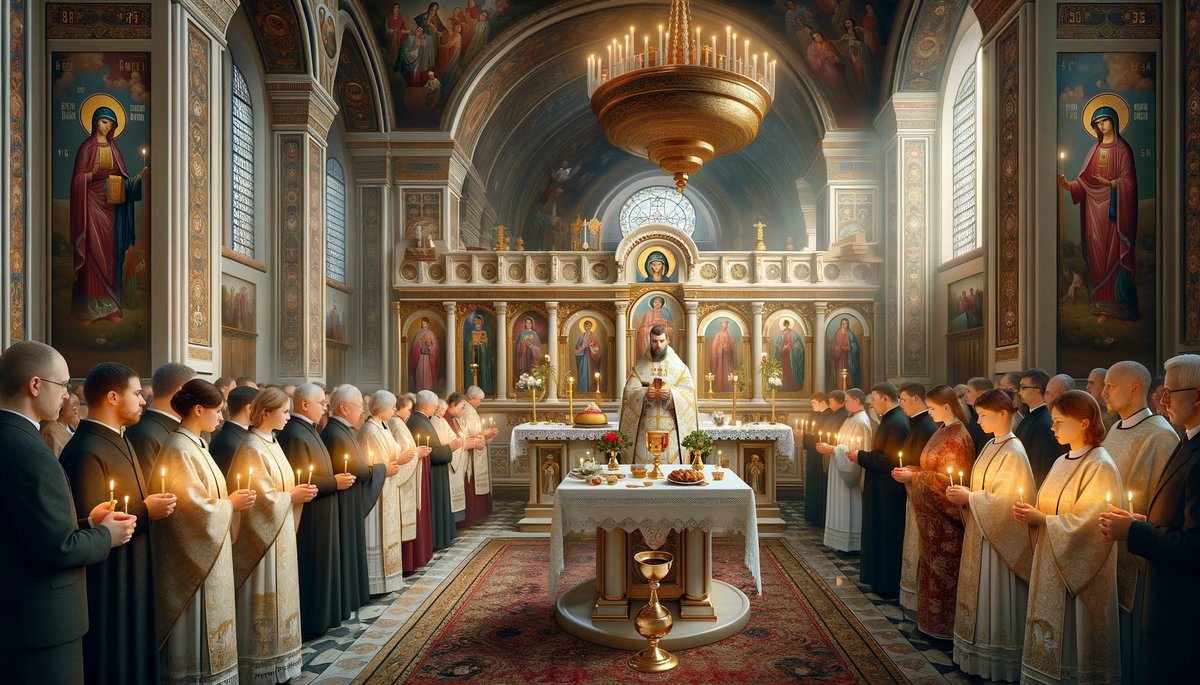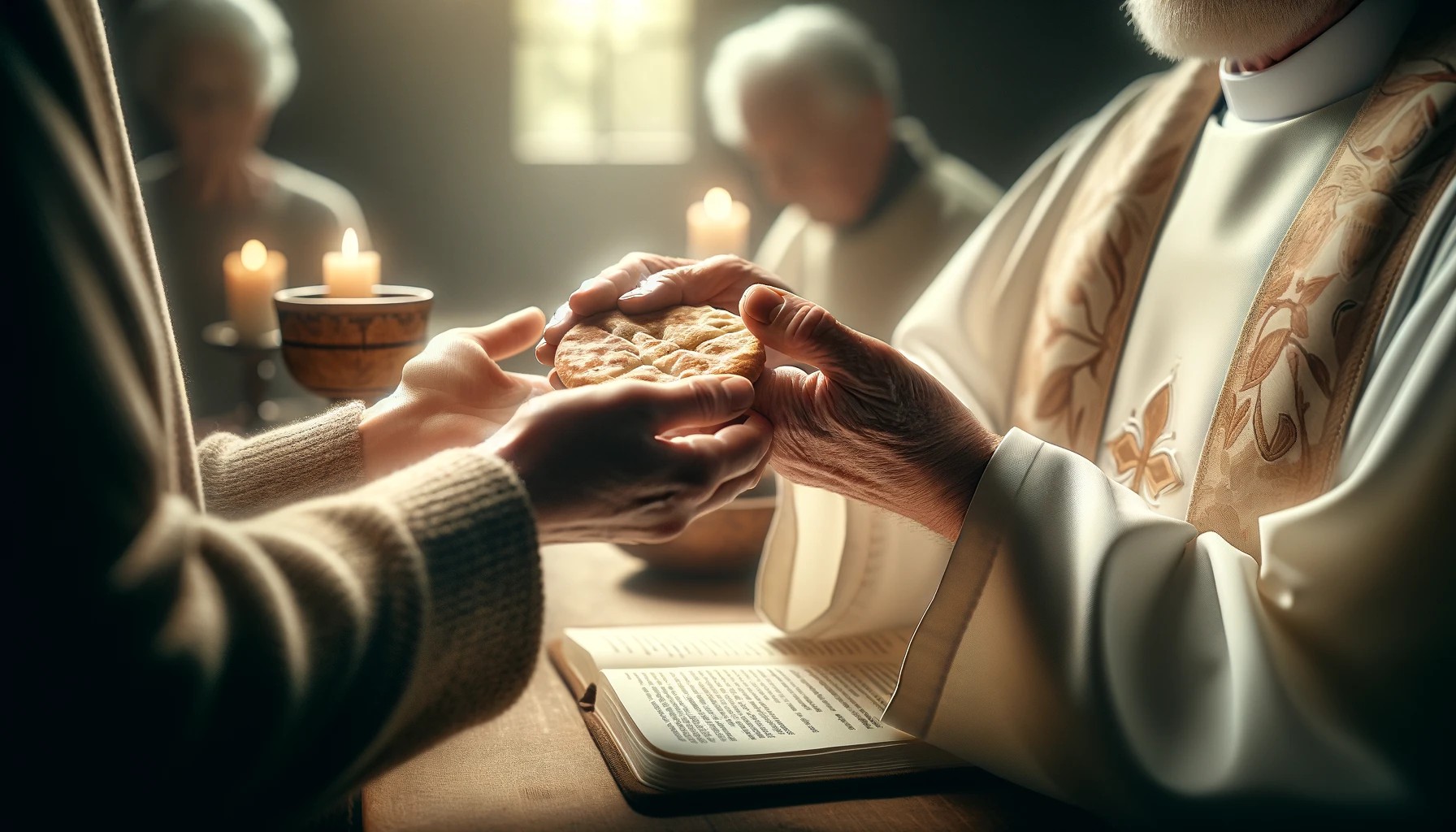Home>Theology and Spirituality>How To Take Orthodox Communion


Theology and Spirituality
How To Take Orthodox Communion
Published: February 25, 2024
Ericka Andersen, an editor at Christian.net, expertly merges digital strategy with content creation, focusing on faith and societal issues. Her communication skills enhance the platform's engaging narratives, fostering meaningful dialogue on belief's impact on society.
Learn the proper way to take Orthodox Communion and deepen your understanding of theology and spirituality with our comprehensive guide. Discover the significance and rituals involved.
(Many of the links in this article redirect to a specific reviewed product. Your purchase of these products through affiliate links helps to generate commission for Christian.net, at no extra cost. Learn more)
Table of Contents
Introduction
Orthodox Communion, also known as the Holy Eucharist, is a sacred and central sacrament in the Eastern Orthodox Christian tradition. It is a profound and transformative act of receiving the body and blood of Jesus Christ, symbolizing the spiritual nourishment and unity of the faithful with Christ and one another. The Orthodox Communion holds deep spiritual significance and is approached with reverence, preparation, and awe.
The act of partaking in Orthodox Communion is rooted in the Last Supper, where Jesus shared bread and wine with his disciples, instructing them to do the same in remembrance of him. This sacred act has been faithfully preserved and practiced in the Orthodox Church for centuries, carrying with it the rich tapestry of tradition, theology, and spiritual devotion.
As we delve into the intricacies of Orthodox Communion, it is essential to approach this topic with a sense of reverence and openness to the profound spiritual mysteries it encompasses. The journey of understanding and participating in Orthodox Communion is a deeply personal and communal experience, inviting individuals to engage with the divine in a tangible and transformative way.
In the following sections, we will explore the significance of Orthodox Communion, the preparation involved, the act of approaching the chalice, receiving the Eucharist, and the post-communion prayers and practices. Each aspect contributes to the holistic and sacred nature of Orthodox Communion, offering a glimpse into the spiritual depth and beauty of this ancient sacrament.
Read more: How Long Does A Greek Orthodox Baptism Take
Understanding the significance of Orthodox Communion
Orthodox Communion, also known as the Holy Eucharist, holds profound significance within the Eastern Orthodox Christian tradition. At its core, Orthodox Communion represents the central sacrament through which believers partake in the body and blood of Jesus Christ. This act of partaking in the Eucharist is deeply symbolic, signifying the spiritual nourishment, unity, and intimate communion with Christ and fellow believers.
The theological underpinnings of Orthodox Communion are rooted in the teachings of Jesus Christ and the apostolic tradition. During the Last Supper, Jesus shared bread and wine with his disciples, instructing them to partake in remembrance of him. This pivotal moment, infused with profound spiritual meaning, serves as the foundation for the Eucharistic celebration within the Orthodox Church.
Central to the understanding of Orthodox Communion is the concept of transubstantiation, which denotes the transformation of the bread and wine into the actual body and blood of Christ. This theological understanding underscores the real presence of Christ in the Eucharist, emphasizing the mystical and transformative nature of the sacrament. Through the act of partaking in the Eucharist, believers are invited to enter into a profound encounter with the living Christ, experiencing his sacrificial love and redemptive grace in a tangible and intimate manner.
Furthermore, Orthodox Communion is not merely an individual act of devotion but a communal expression of faith and unity. As believers partake in the Eucharist together, they are reminded of their interconnectedness within the body of Christ, fostering a sense of spiritual solidarity and shared identity as members of the faith community. This communal aspect of Orthodox Communion reflects the profound bond that believers share with one another through their common participation in the life-giving sacrament.
In essence, Orthodox Communion transcends the boundaries of time and space, connecting believers with the historical, present, and eschatological dimensions of the faith. It serves as a sacred conduit through which the divine and the human intersect, inviting believers to partake in the eternal mystery of Christ's redemptive work. As such, Orthodox Communion stands as a testament to the enduring significance of the Eucharist within the Eastern Orthodox Christian tradition, embodying the spiritual richness, theological depth, and communal unity that characterize this sacred sacrament.
Preparing for Orthodox Communion
Preparing for Orthodox Communion is a deeply reverent and introspective process that encompasses spiritual, physical, and emotional readiness. The journey towards partaking in the Holy Eucharist involves intentional preparation, self-examination, and a disposition of humility and repentance. This sacred preparation is rooted in the belief that approaching the Eucharist requires a heart and mind attuned to the transformative encounter with Christ's presence in the sacrament.
Spiritual Preparation
Central to preparing for Orthodox Communion is engaging in spiritual introspection and self-examination. Believers are encouraged to engage in the practice of metanoia, which involves sincere repentance and turning towards God. This introspective process entails reflecting on one's thoughts, actions, and attitudes, seeking reconciliation and spiritual renewal. Through prayer, contemplation, and seeking the guidance of a spiritual father or mother, individuals strive to cultivate a state of spiritual readiness and receptivity to the grace imparted through the Eucharist.
Fasting and Abstinence
Fasting holds a significant place in the preparation for Orthodox Communion. The period of fasting before partaking in the Eucharist serves as a means of spiritual discipline and preparation. This typically involves abstaining from certain foods and drinks, as well as observing the prescribed fasting periods set by the Church. Fasting fosters a sense of discipline, self-control, and heightened spiritual awareness, allowing individuals to approach the Eucharist with a purified body and soul.
Read more: How To Take The Holy Communion
Confession
The sacrament of confession, or the sacrament of repentance, is an integral part of preparing for Orthodox Communion. Through the act of confession, believers have the opportunity to unburden their hearts, seek forgiveness for their shortcomings, and receive spiritual guidance. Confession serves as a means of spiritual healing and reconciliation, enabling individuals to approach the Eucharist with a cleansed conscience and a renewed commitment to living a life reflective of Christ's teachings.
Reverent Attire and Demeanor
As part of the preparation for Orthodox Communion, believers are encouraged to approach the Divine Liturgy with a demeanor of reverence and humility. This includes dressing modestly and respectfully, acknowledging the sacredness of the Eucharistic celebration. The outward expression of reverence through attire and demeanor reflects the inner disposition of the heart, signifying a deep respect for the sanctity of the Eucharist and the divine encounter it entails.
In essence, preparing for Orthodox Communion is a holistic and intentional process that encompasses spiritual, physical, and emotional dimensions. It calls for a profound commitment to spiritual readiness, self-examination, and a disposition of humility and reverence. Through engaging in spiritual introspection, fasting, confession, and embodying a reverent demeanor, believers strive to approach the Eucharist with hearts and minds attuned to the transformative encounter with the living Christ in the sacrament of the Holy Eucharist.
Approaching the chalice
As the moment of Orthodox Communion approaches, believers prepare to approach the chalice with a profound sense of reverence and awe. The act of approaching the chalice, where the consecrated body and blood of Christ are offered, is a deeply sacred and transformative experience within the context of the Divine Liturgy.
As the faithful await their turn to partake in the Eucharist, a sense of anticipation and spiritual readiness permeates the atmosphere. The approach to the chalice is marked by a deliberate and intentional procession, guided by the gentle rhythm of liturgical hymns and the solemnity of the sacred space.
Believers, having engaged in spiritual preparation and having received the blessing of their spiritual father or mother, approach the chalice with a demeanor of humility and reverence. Each step toward the chalice is imbued with a profound sense of anticipation, as individuals prepare to receive the tangible manifestation of Christ's presence in the Eucharist.
The act of approaching the chalice is not merely a physical movement but a spiritual journey, symbolizing the believer's longing to draw near to the living Christ. As individuals draw closer to the chalice, their hearts are filled with a sense of awe and gratitude, recognizing the profound mystery and grace that awaits them.
Upon reaching the chalice, believers come before the clergy who administer the Eucharist, holding the sacred vessels with utmost care and reverence. The communicants, with hands crossed over their chest, bow before the chalice, acknowledging the sanctity of the moment and expressing their profound reverence for the body and blood of Christ.
The approach to the chalice culminates in the reception of the Eucharist, as the clergy offer the consecrated bread and wine to the faithful. With trembling hands and hearts filled with devotion, believers partake in the body and blood of Christ, experiencing the transformative encounter with the living Lord in the sacrament of the Holy Eucharist.
In essence, the act of approaching the chalice is a sacred and deeply meaningful journey, embodying the believer's longing to commune with Christ and be nourished by his divine presence. It is a moment marked by reverence, anticipation, and a profound sense of spiritual union, encapsulating the timeless significance of Orthodox Communion within the life of the faithful.
Receiving the Eucharist
The act of receiving the Eucharist within the context of Orthodox Communion is a deeply profound and transformative experience, encapsulating the pinnacle of the believer's encounter with the living Christ. As the consecrated bread and wine are offered to the faithful, the reception of the Eucharist unfolds as a sacred moment of communion, symbolizing the intimate union between the believer and the divine.
Upon approaching the chalice, the communicant, with hands crossed over their chest, receives the consecrated bread, known as the Body of Christ, from the clergy. This act of receiving the Eucharist is marked by a sense of awe and reverence, as the communicant partakes in the tangible manifestation of Christ's presence. With humility and devotion, the communicant consumes the consecrated bread, acknowledging the transformative significance of this sacred encounter.
Following the reception of the Body of Christ, the communicant approaches the chalice once more to receive the consecrated wine, known as the Blood of Christ. As the clergy offer the chalice, the communicant partakes in the precious blood, embracing the profound mystery of Christ's redemptive sacrifice and the outpouring of his love. This act of receiving the Eucharist culminates in a moment of spiritual communion, as the believer is nourished by the life-giving sustenance of Christ's body and blood.
The reception of the Eucharist is not merely a symbolic gesture but a transformative encounter with the living Lord. Through partaking in the body and blood of Christ, believers are invited into a profound communion with the divine, experiencing the grace, mercy, and love of Christ in a tangible and intimate manner. This sacred act of receiving the Eucharist serves as a source of spiritual nourishment, renewal, and communion, fostering a deep sense of unity and intimacy with Christ and the faith community.
In essence, the reception of the Eucharist within Orthodox Communion embodies the believer's longing to be united with Christ, to be nourished by his divine presence, and to be transformed by the grace imparted through this sacred sacrament. It stands as a testament to the enduring significance of the Eucharist within the Eastern Orthodox Christian tradition, encapsulating the timeless beauty, depth, and spiritual richness of this sacred act of communion with the living Christ.
Post-communion prayers and practices
Following the reception of the Eucharist, believers engage in a series of post-communion prayers and practices that serve to deepen their spiritual experience and integrate the transformative encounter with Christ into their daily lives. These post-communion prayers and practices are integral to the holistic journey of Orthodox Communion, nurturing a sense of spiritual continuity and offering a framework for reflection, gratitude, and ongoing communion with the divine.
Prayer of Thanksgiving
Central to the post-communion prayers is the Prayer of Thanksgiving, wherein believers express their gratitude for the profound encounter with Christ in the Eucharist. This prayer serves as a heartfelt expression of thanksgiving for the spiritual nourishment received, the communion with Christ, and the transformative grace imparted through the Eucharist. It is a moment of profound gratitude and acknowledgment of the divine presence experienced in the sacrament.
Reflection and Contemplation
Following the reception of the Eucharist, believers are encouraged to engage in reflective contemplation, allowing the profound experience of communion with Christ to resonate within their hearts and minds. This period of contemplation provides an opportunity for individuals to internalize the spiritual nourishment received, to meditate on the significance of their encounter with the living Christ, and to cultivate a sense of spiritual awareness and receptivity to the ongoing presence of God in their lives.
Acts of Compassion and Service
The post-communion experience extends beyond the walls of the church, inspiring believers to embody the love and compassion of Christ in their interactions with others. Encouraged by the transformative encounter with Christ in the Eucharist, believers are called to engage in acts of compassion, service, and kindness, reflecting the selfless love and sacrificial nature of Christ's redemptive work. This outward expression of love and service becomes a tangible manifestation of the spiritual nourishment received in the Eucharist, fostering a sense of communal unity and shared responsibility within the faith community.
Spiritual Renewal and Commitment
The post-communion period serves as a time of spiritual renewal and recommitment to living a life reflective of Christ's teachings. Believers are encouraged to embrace the transformative grace received in the Eucharist, seeking spiritual renewal and a deepening of their commitment to embody the values of the Gospel in their daily lives. This ongoing journey of spiritual growth and renewal is nurtured through prayer, self-examination, and a steadfast dedication to living out the principles of faith, love, and compassion exemplified by Christ.
In essence, the post-communion prayers and practices serve as a continuation of the sacred encounter with Christ in the Eucharist, fostering a sense of gratitude, reflection, and ongoing communion with the divine. These prayers and practices provide a framework for believers to integrate the transformative experience of Orthodox Communion into their daily lives, nurturing a sense of spiritual continuity and inspiring a commitment to embody the love, compassion, and grace of Christ in all aspects of their existence.
Conclusion
In conclusion, the journey of Orthodox Communion is a profound and transformative experience that encompasses the spiritual, theological, and communal dimensions of the Eastern Orthodox Christian tradition. From the preparation and approach to the chalice to the reception of the Eucharist and the post-communion prayers and practices, Orthodox Communion stands as a testament to the enduring significance of the Eucharist within the life of the faithful.
The significance of Orthodox Communion extends beyond the confines of a singular sacramental act, embodying the timeless beauty, depth, and spiritual richness of the encounter with the living Christ. It serves as a sacred conduit through which believers partake in the eternal mystery of Christ's redemptive work, fostering a deep sense of unity, communion, and spiritual nourishment within the faith community.
The preparation for Orthodox Communion, marked by spiritual introspection, fasting, confession, and reverent demeanor, underscores the believer's commitment to approaching the Eucharist with a heart and mind attuned to the transformative encounter with Christ's presence. This intentional preparation serves as a testament to the sacredness of the Eucharistic celebration and the believer's longing to commune with the living Lord.
The act of approaching the chalice and receiving the Eucharist unfolds as a sacred journey, symbolizing the believer's profound longing to draw near to the living Christ and be nourished by his divine presence. This moment of communion with the divine transcends the boundaries of time and space, inviting believers into a profound encounter with the real presence of Christ in the Eucharist.
Furthermore, the post-communion prayers and practices provide a framework for believers to integrate the transformative experience of Orthodox Communion into their daily lives, nurturing a sense of spiritual continuity and inspiring a commitment to embody the love, compassion, and grace of Christ in all aspects of their existence.
In essence, Orthodox Communion stands as a testament to the enduring significance of the Eucharist within the Eastern Orthodox Christian tradition, embodying the spiritual richness, theological depth, and communal unity that characterize this sacred sacrament. It serves as a source of spiritual nourishment, renewal, and communion, inviting believers to partake in the eternal mystery of Christ's redemptive love and grace.












